International travel is well and truly back on the cards, so it’s time to ensure you have the best travel debit cards ready to go at all times!
There’s a lot to think about when heading overseas and choosing the right way to spend money is at the top of many travellers’ ‘to do’ lists.
Regardless of whether you’ve got a trip coming up, travel debit cards can be very useful when shopping with overseas retailers online.
Like with many things, we’re spoiled for choice when it comes to travel debit cards in Australia, which can be a blessing and a curse if you tend to get easily overwhelmed like me.
We’ve taken the liberty of rounding up the best travel debit cards of 2024 to have on hand. Keep reading for our top picks.
What is a travel debit card?
Travel debit cards offer an alternative to carrying cash with the convenience of spending with a credit card.
Linked to a transaction account, debit cards are designed for everyday money transactions, while travel debit cards are simply armed with a series of travel-specific features such as low or no overseas transaction fees.

Why go overseas with a travel debit card?
Behind the social media posts hides a more practical part of travel. Safe and convenient access to cash when travelling is non-negotiable.
While having some cash-on-hand can be useful depending on where you’re overseas, having access to money on a card is a much more practical way to travel.
The best travel debit cards will allow you to call anywhere at any time to cancel your card within minutes of it being lost or stolen.
Nightmares aside, budgets are often paramount when travelling, which is why spending your own money with a travel debit card can be a good way to manage your spending when you’re away.
Our best picks: 5 best travel debit cards of 2024
Australian-based travellers have a host of good travel debit cards to choose from, with each offering different features.
Not all debit cards are created equally, so it’s important to shop around and assess which features benefit your individual travel and spending habits.
Ubank Spend Account
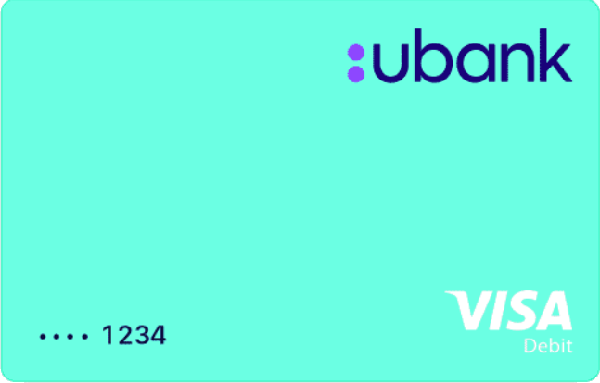
The ubank Spend account functions as a transaction account linked to a Visa debit card.
No monthly account fees, no overseas ATM withdrawal fees and no international transaction fees position the ubank Spend account as a compelling option for travellers, as well as everyday transactional use in Australia.
We’ll both score $20 when you sign up using my code, T5JC1XS, and make 3 purchases using your debit card or phone. Once you’ve downloaded the app, make sure you enter the referral code you received on the “About you” screen during the sign-up process.
Pros
- Competitive interest rates
- No foreign transaction fees
- No account-keeping fees
- Sign on bonus
- Smart features to help you manage and save your money
Cons
- This is a mobile-only product
- No physical branches
- No rewards
Our verdict: With no foreign transaction fees, the ubank Spend account is positioned as an appealing option for frequent overseas travellers and online shoppers. Plus, no account-keeping fees or minimum balance allows the account holder to use it as a standard transaction account between trips.
Read our Ubank Spend Account review or join here.
HSBC Everyday Global Account
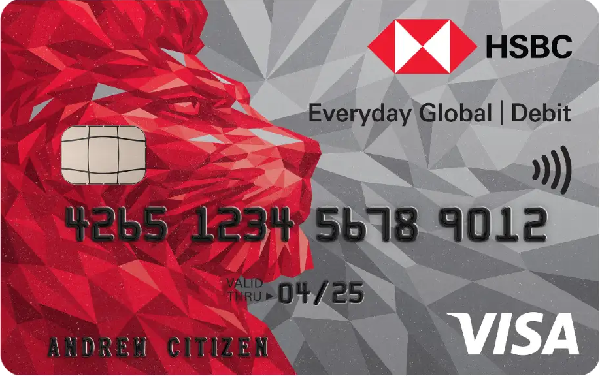
The HSBC Everyday Global Account is an all-in-one everyday transaction account to deposit your salary, pay bills and transact in foreign currencies.
This card gives you the option of having a combination of foreign currency sub-accounts linked to a Visa debit card.
Pros
- No foreign transaction fees
- No international ATM fees
- Uses local currency
- Earn cashback
- Support at branches
Cons
- Monthly deposit requirements
- Can’t earn interest
Our verdict: A HSBC Everyday Global account may offer value, particularly for Australian-based travellers who want to benefit from holding multiple different currencies – up to 10 at once.
Read our HSBC Everyday Global Account review or join here.
ING Orange Everyday Account
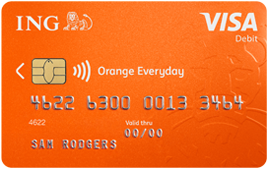
The ING Orange Everyday account operates as a transaction account, with the ability to link to a Visa debit card.
Value-adds including cashback on utility bill payments can leave extra money in your pocket, positioning the ING Orange Everyday account as a compelling option for day-to-day use.
Pros
- No international transaction fees
- Five rebated overseas ATM withdrawals per month
- $0 ATM withdrawal fees on ING ATM network
- Utility bill cashback
Cons
- $1,000 monthly deposit requirement
- Cap on ATM withdrawal rebates
- 5 card purchases are required per month
Our verdict: Fulfilling a monthly $1,000 deposit and making five card purchases each month could position the ING Orange Everyday account as an appealing option for frequent overseas travellers and online shoppers.
However, less frequent spenders may incur foreign transaction and ATM fees that could make this account a less ideal option to use for travel.
Read our ING Orange Everyday Account review or join here.
Macquarie Transaction Account
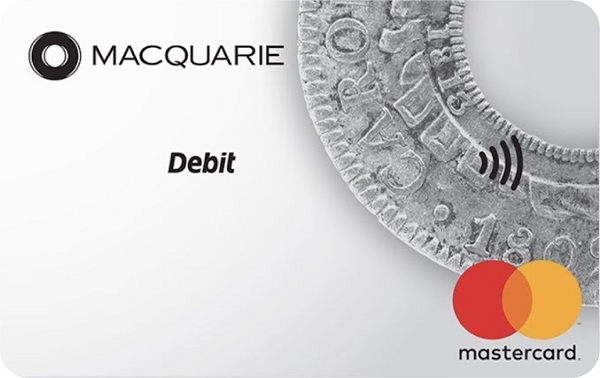
The Macquarie Transaction Account is a bank account that offers easy access to your money while paying interest and paying less fees.
An earn rate of up to 4.00% interest, no account fees, no international fees, and refunds on all Australian ATM fees are some of the features that set the Macquarie Transaction Account apart from the pack.
Pros
- No account-keeping fees
- No foreign transaction fees
- $0 ATM withdrawal fees at home and overseas
- Earn interest on your balance – no minimum required
Cons
- No physical branches
Our verdict: If you like to shop, travel and have savings goals, then the Macquarie Transaction Account could be for you.
Up Everyday Account
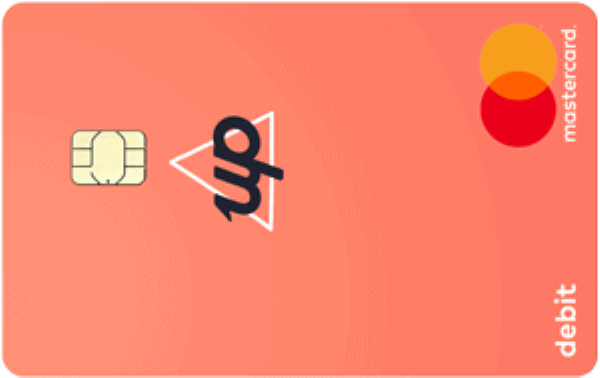
The Up Everyday Account boasts no account-keeping fees, no foreign transaction fees, a quick setup, and modern app features.
Other modern features that make the Up Everyday Account stand out include a user-friendly interface that allows users to review spender history, payment splitting, the ability to detect upcoming charges, as well as pay friends by name.
Pros
- Can be linked to an interest savings account
- No foreign transaction fees
- Travel and saving-friendly in-app controls
- Referral bonus
- Pay others using their Upname
Cons
- Geared towards a younger demographic
- No physical branches
Our verdict: An Up Everyday Account may offer value, typically for young Australians who want a card that can possibly help them save and travel with ease. That said, it’s not suited to everyone – particularly those who value the benefits of a physical branch.
Read our Up Everyday Account Review or join here.
Wise Multi-Currency Account

The Wise Multi-Currency Account debit card functions just like a debit card you’d use from an Australian bank and is welcome anywhere Mastercard is accepted.
This account lets you store up to 50 types of foreign currency between five international bank accounts, including EURO, USD, GBP, AUD, CAD, NZD, SGD, and JPY.
You can use the Wise debit card to withdraw money and change it to the local currency, provided you are in a country (like Australia) that qualifies.
Pros
- No sneaky foreign transaction fees
- No account-keeping fees
- Low conversion fees guaranteed
- Hold more than 50 different currencies in your account
- Online shopping friendly
Cons
- Complex fee structure
- Not so competitive on regular cash withdrawals
- No physical branches
Our verdict: It’s worth considering whether you would get use out of the Wise Multi-Currency Account’s features, if not, perhaps a low-fee digital bank account could be a better option.
Read our Wise Multi-Currency Account review or join here.
Best travel debit cards of 2024 at a glance
The table below offers an outline of the features and benefits that each card offers.
It is important to note that while account holders won’t incur a fee at most major bank-owned ATMs in Australia and overseas, some external ATM operators may pass on their own fees.
How do I get a travel debit card
Getting a travel debit card is usually fairly quick and painless. All the best travel debit cards we’ve mentioned accompany a linked transaction account, which you’ll need to apply for.
Most applications will involve an easy online form that can be completed in around 10 minutes, while some banks still allow customers to apply over the phone or inside a branch.
As a general rule, you’ll need to have your identification on hand. Once your details have been verified, you’ll receive your new debit card in the mail.
Which travel debit cards should I avoid?
It is likely possible to use your existing debit card overseas, however, it is important to check the fees first.
Most cards that aren’t geared for travel will pass on pesky ATM and foreign transaction fees, which can really add up!
In saying that, some of the big banks that offer the best travel debit cards still come with sneaky fees, which defeats the purpose of a travel card anyway.
While it can seem easier to go with one of the bigger banks, it usually makes more sense to do your research and open up a new account with low or no international fees before you head overseas.
Our expert tips
Saving up for a holiday can be tricky enough, so you don’t want to be diving through hoops to avoid fees once you’re away. Here are a few extra tips to keep up your sleeve to ensure you travel with ease:
- Research travel debit cards issued by smaller neo-banks before you head away. These banks are often backed by the bigger banks (ensuring your money is safe), but usually pass on lower (or no) fees.
- Carry a back-up debit card to ensure you still have access to money in the event that your primary card is lost or stolen. We suggest having one card with you and leaving another securely stored in your luggage.
- Use your travel debit card for online purchases to avoid foreign transaction fees when shopping with overseas retailers online.
Summing up: The best travel debit cards
Whether you’re heading overseas, saving for a trip or staying put, choosing the bets travel debit cards may offer value for travellers who want to benefit from no hidden fees.
Neo-banks usually offer low to no fee options that come armed with various travel-friendly features for the modern banker. In saying this, many smaller banks don’t offer the convenience of stepping into a physical branch, which may not suit everyone.
While it is likely possible to take your existing debit card away with you, we suggest having a good look at the fee structure first, as the big banks often pass on sneaky fees, even when their debit cards are geared towards travel.
Travel aside, your debit card may come in handy between trips when shopping with overseas retailers online or saving for your next journey.
From cashback to referral bonuses and competitive interest rates, every travel debit card comes armed with different perks, so it’s important to choose the card that works for you.
Be sure to check out our individual travel debit card reviews when researching which card best suits your globetrotting needs.
FAQ – Best travel debit cards
What is the difference between a debit card and travel card?
The key difference is that the best travel debit cards are preloaded with foreign currency at a set exchange rate. A debit card, on the other hand, only has Australian dollars on it, so (depending on the card) you may pay a currency conversion fee with each overseas purchase.
Is a travel card better than a debit card for travelling overseas?
A travel card will generally have better exchange rates, however, debit cards are usually more convenient to use. Shopping around for a good travel debit card with low to no fees means you can travel with ease and use your card as normal in Australia too.
Can you use an Australian debit card overseas?
You can use most Australian debit cards overseas, but it is important to notify your bank of your travels in advance to know for sure and avoid overseas purchases being mistaken for suspicious activity.
Which travel debit card is best for international travel?
The best travel debit cards are going to have low or no international transaction fees, as well as the features that best suit you.
While you’re here: Subscribe to our newsletter for the latest tips, deals and news. It only takes a few seconds and we respect your privacy:




